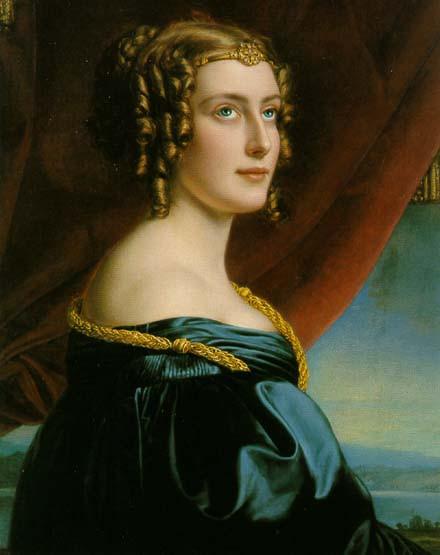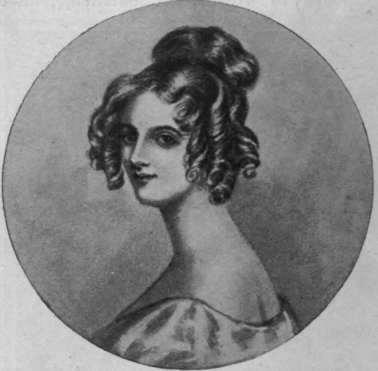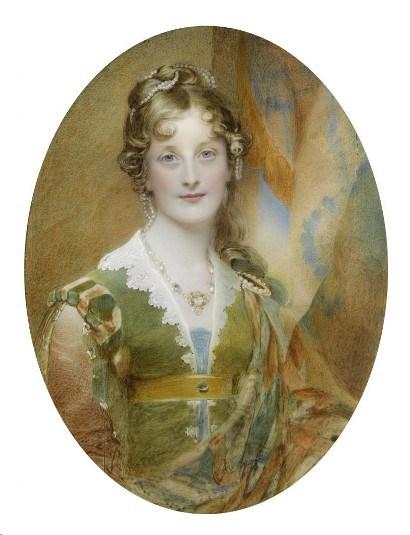
Jane Digby, Stieler, 1831. Photo: Schloss Nymphenburg.
What a beauty. I had SUCH a girl crush on Jane Digby when I was a child, after reading about her life in a guide book to one of the Digby family piles, Sherborne Castle in Dorset. We were living on the estate of the Earl of Cottenham at the time (I used to babysit the current Earl in fact, which is possibly the grandest part of my employment history) and I remember being highly excited when I found out that he was related to Jane – as well as being related to those other famous scions of the Digby family: Kenelm and Venetia. Oh and he was related to Samuel Pepys as well (the fact that his family name still is Pepys – pronounced confusingly Pepp-is – was a bit of a giveaway here!). Lucky. In fact his name actually was Kenelm Pepys – it’s like the greatest seventeenth century mashup of all time. Imagine being related to Kenelm Digby, Samuel Pepys AND Jane Digby? I’d be writing poetry, having adventures and living fabulously ALL DAY LONG.
Anyway, the most excellent Jane Digby was born on the 3rd of April 1807, daughter of Admiral Henry Digby and his exceptionally beauteous wife, Lady Jane Elizabeth Coke, daughter of the 1st Earl of Leicester and widow of Viscount Andover. The Digby couple had three children, of which Jane was the middle child and only daughter. Admiral Digby sounds like a character from an Austen novel (specifically Persuasion) though and was by all accounts an exceptional Naval officer, who saw action in the French Revolutionary Wars and Napoleonic War and took part in Trafalgar (where he went against Nelson’s orders). It was his extensive prize money gained during these campaigns that established the family fortunes however as they made him an extremely wealthy man and enabling him to set up a grand family seat at Minterne House in Minterne Magna in Dorset, where Jane, who was a tremendous tomboy in her youth albeit clearly a Heroine In Training in the manner of the finest tradition of both Austen and Heyer, and her brothers grew up amidst great comfort.
Inheriting all of her mother’s great beauty and charm as well as her own vivacious wilful charisma and a sophisticated polish gained from spending time abroad, Jane was inevitably not to remain unmarried for long and on the 15th of October 1824, aged just seventeen, she was married to the thirty four year old 2nd Baron Ellenborough, who was by all accounts utterly enraptured by his young bride’s radiant beauty and had in fact proposed to her after just eight weeks of acquaintance while she, for her part, had her pretty head completely turned by the ostentatious wooing of his handsome, intelligent, ambitious older man. The couple had just one child, Arthur, who was born in February 1828 but lived for just two years, dying in 1830.

Jane Digby.
However, by the time of her son’s death, Jane Digby’s marriage had already gone completely off the rails and was, in fact, beyond a state of repair. Despite their earlier infatuation, it turned out that the Ellenboroughs were in fact utterly incompatible and that Jane in particular felt constricted by matrimony as well as neglected by her spouse, who devoted most of his time to developing his political career, thus leaving Jane alone for large amounts of time. Whereas other young women of the time felt that getting married held the key to gaining more personal freedom as they took charge of their own households and were able to dispense with the restrictions imposed upon unmarried girls, Jane seems to have felt hampered by all of this and so did what unhappy spouses have done for time immemorial when they feel bored, ignored and trapped within their marriages: she had an affair.
Jane’s first extra-marital affair was with her cousin, the dashing and rather rakish Colonel George Anson, whom she had had a bit of a thing for ever since childhood and suspected may even have been the father of her son, Arthur. Things soon went awry with George however and Jane was left heart broken and feeling even more abandoned than she had done before.
She soon moved on however to the Bohemian Prince Felix of Schwarzenberg, who was charming, erudite and very handsome in a sort of aquiline Teutonic sort of way. He was attached to the Austrian embassy in London when he and Jane first met in 1828 and immediately fell head over heels in love with her, although Jane, who was still feeling heartsore after the end of her affair with Anson, was rather less enthusiastic. This soon changed though and the couple embarked on an affair, which although it started off discreetly enough would soon cause ripples of scandalised and rather hypocritical gossip to course through high society. Of course, everyone else was having affairs but they did so discreetly, maintaining at all times a veneer of respectability. Jane and Felix, on the other hand, although they tried to keep up appearances at first, soon got ridiculously cocky and she began to be seen visiting him at all sorts of hours, heavily veiled of course but easily recognisable as the beautiful Lady Ellenborough.
Things really became disastrous however when Jane found herself to be pregnant again and this time there could be no doubt that father was not her husband. Compounding this disaster further, Jane and Felix decided to spend some time at a hotel in the countryside, only to be observed there together and then betrayed by the hotel porter, who wrote to her husband to spill the beans. Lord Ellenborough, however, refused to believe this tittle tattling tale of iniquity, but was forced to face the truth when his friends started to come forward and give him hard talkings to about what his wife had been getting up to when he was busy with his political meetings. Not that Ellenborough himself was entirely blameless – he had mistresses as well, but of course that was considered quite alright as he wasn’t the one expected to produce a legitimate heir and besides, at least he played the game the right way and kept his peccadillos quiet.
Disturbed by what he was hearing, Lord Ellenborough hired a private investigator, who confirmed everything that he had been told about Jane’s relationship with Prince Felix. Divorce, of course, was still relatively unheard of even in the upper crust and wealthy circles that the Ellenboroughs moved in and so it is likely that his original plan was to merely cast Jane and her children off and arrange for them to live out their days in the countryside, shunned by all decent society. Jane, however, was having none of this and when Prince Felix, alarmed by the speed with which events were progressing, hastened back to the Continent to avoid his own reputation getting besmirched alongside that of his mistress, Jane insisted upon going after him.

Jane Digby, Ross. Photo: Bonhams.
Her family and remaining friends were horrified and did their best to persuade her to stay and face the music in England, arguing that if she went abroad and lived openly with her lover then she would be lost forever. Jane was adamant though and was having none of it. She was a woman in love and having tested the water by breaking free of some of the boundaries imposed upon her by her position in life, she saw no reason not to go the whole way and escape altogether. She headed off to Basel in Switzerland, where she gave birth to her daughter Mathilde in November 1829. Meanwhile, Lord Ellenborough started divorce proceedings, which caused a massive scandal, landing the estranged couple on the front page of newspapers and making them the talk of the town before the divorce was granted in 1830.
However, by the time she was free for good of Ellenborough, Jane was already beginning to have problems with Prince Felix, who was definitely showing the signs of getting cold feet about the whole thing and had crushed her feelings considerably by announcing that as a Catholic there was no way that he could ever marry a divorced woman. However, the couple were still together enough to conceive another child: a boy, Felix, who was born in Paris in December 1830 but sadly died just over a week later. Jane’s already rocky relationship did not long survive this blow and shortly afterwards, Prince Felix took off and left her.
Jane was devastated by this desertion but then eventually rallied herself and went off to Munich, where she met and immediately enchanted Ludwig I of Bavaria, who was utterly entranced by her English rose beauty. Their affair didn’t last long though as Jane was still hankering after Prince Felix, who, confusingly, was still blowing hot and cold on her, which meant that she never felt quite able to break free of him.
Her next lover was a German Baron, Karl von Venningen, by whom she quickly became pregnant again – giving birth in Palermo, Italy to a son, Heribert in January 1833. She had traveled out to Italy to escape the scandal of once again giving birth to an illegitimate child and, as was the practice, had to leave her son with a foster family until she was able to get him back again. Mathilde, her daughter, was at this time also left with Felix’s sister before Jane, probably deciding that it was as good a way as any to cut all painful ties with Prince Felix, decided to marry Baron von Venningen and do her best to try once again to make a dutiful wife.
To the surprise of precisely no one, this period of domestic bliss didn’t last long although it meant that young Heribert could live with her again and the couple went on to have another child, a daughter, Bertha in September 1834. Jane was soon restless again though and by 1838, she had embarked on another affair – this time with a good looking Greek called Count Spyridon Theotokis. Bored and fed up with her marriage, Jane agreed to elope with her lover but they were apprehended by her husband who then challenged Count Theotokis to a duel, wounding him in the process although not mortally. His honor more or less salvaged by this act of antiquated chivalry, the Baron then nobly allowed Jane to leave, although he kept charge of their children.
Jane and Spyridon had a son, Leonidas in Paris in March 1840 but did not get married until a year later after Jane had converted to the Greek Orthodox faith but before she was legally divorced from Baron Karl. The family moved to Athens but things soon went sadly awry when Leonidas, who was adored by his parents, died at the age of six after falling from a balcony. Jane’s marriage was also in trouble by this point as her husband gradually returned to his previous life of hard drinking and womanising and so she did what she always did, she had an affair, this time with King Otto of Greece, which wasn’t a popular move with his formidable wife, Amalie. Her marriage floundered and by 1846 they were divorced, after which Jane started another relationship, this time with Thessalian brigand general Christodoulos Hatzipetros, who provided her with the life of excitement and adventure that she had always craved by taking her out with his troops.

Jane Digby, Hayter?, 1824.
It didn’t last though and she eventually caught wind that he was cheating on her with her own maid and so walked out. Depressed and downhearted about her strife filled marital history, ongoing estrangement from her family and general man troubles, it was at this point that Jane decided to give up on men, who had, after all, brought her nothing but trouble, and embark on her greatest adventure yet, having no doubt caught a taste for picturesque rough living from her Thessalian brigand, and headed off to the Middle East to see something more of the world than the degenerate side of European courts.
By this time she was in her mid forties and still just as beautiful as ever but her earlier naive glow had been replaced by a sultry sophistication that, ironically, made her more attractive than ever. Fascinated by the story of the Syrian warrior Queen Zenobia, she decided to travel to Palmyria to visit what remained of Zenobia’s kingdom and it was there, when she was no longer looking for love, that she met the great love of her life, Sheikh Medjuel el Mezrab, an educated, erudite, charmer twenty years her junior. From the moment they met they were inseparable, with the Sheikh offering to leave his wife for Jane and she knowing immediately that she had finally met her match.
Always romantic and adventurous by nature, Jane thoroughly embraced her new husband’s life – spending six months of the year living a nomadic tented existence in the desert sands while the other half of the year was spent in considerably more style in a mansion in Damascus. Although she never converted to Islam, Jane adopted Arab dress, added Arabic to the extensive list of languages that she spoke fluently (making a total of nine) and adopted the position of mother to her husband’s tribe, who, in their turn, adored her. After years of romantic escapades, heartbreak and wanderings around Europe, Jane had finally found her home and the perfect man, one who absolutely understood and appreciated her questing, bold, restless nature, to share her future adventures with.
Jane Elizabeth Digby el Mezrab died in her husband’s arms in Damascus on the 11th of August 1881 at the age of seventy four.
******
Set against the infamous Jack the Ripper murders of autumn 1888 and based on the author’s own family history, From Whitechapel is a dark and sumptuous tale of bittersweet love, friendship, loss and redemption and is available NOW from Amazon UK and Amazon US.
‘Frothy, light hearted, gorgeous. The perfect summer read.’ Minette, my young adult novel of 17th century posh doom and intrigue is now 99p from Amazon UK and 99c from Amazon US. CHEAP AS CHIPS as we like to say in dear old Blighty.
Blood Sisters, my novel of posh doom and iniquity during the French Revolution is just a fiver (offer is UK only sorry!) right now! Just use the clicky box on my blog sidebar to order your copy!
Follow my blog with Bloglovin
Follow me on Instagram.
Follow me on Facebook.
Follow me on Twitter.
